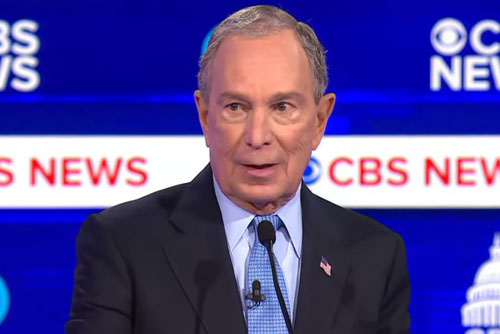by WorldTribune Staff, February 26, 2020
Mike Bloomberg is approaching half a billion dollars spent on his current attempt to buy the Democratic Party’s presidential nomination.
Dropping all that cash, of which the billionaire has plenty to spare, got the former New York City mayor instant points in the polls and a presence on the debate stage despite his late arrival on the campaign scene.

During Tuesday night’s South Carolina debate on CBS News, Bloomberg also seemed to insist that it was his millions which got the Democrats their current majority in the House of Representatives.
“Let’s just go on the record,” Bloomberg said. “They talk about 40 Democrats, 21 of those were people that I spent $100 million to help elect. All of the new Democrats that came in, put Nancy Pelosi in charge, and gave the Congress the ability to control this president, I bought – I got them.”
In 2018, The New York Times highlighted how Bloomberg’s bucks helped tilt the scales in the favor of the Democrats:
“But in this year’s midterm elections, Mr. Bloomberg, the former mayor of New York, emerged as a powerful and effective force, as well as the biggest outside spender promoting Democratic House candidates, according to disclosures filed with the Federal Election Commission. And while it’s impossible to conclude that any one factor tipped the balance in a race, Mr. Bloomberg appears to have reaped the benefits of his millions in giving. Democrats won 21 of the 24 races he sought to influence. Of those, 12 had been considered either tossups or in Republican districts.”
After what most observers and pundits agreed was an abysmal performance in the Las Vegas debate, many had written off Bloomberg. It has happened before. But, there’s that mountain of cash.
Former New York Rep. Steve Israel noted in an op-ed for The Hill that “Every political campaign he has ever run was initially laughed at by the pundit class. But in each one, he had the last laugh. Consider his first campaign for mayor of New York City in 2001. A political operative called it ‘kinda goofy’ and that echoed the conventional political wisdom at the time.
“Bloomberg was a billionaire Republican running in an overwhelming Democratic city. He was facing the highly charismatic Mark Green, the New York City public advocate, and his oratory had the passion of the economics professor played by Ben Stein in ‘Ferris Bueller’s Day Off.’ Bloomberg ended up spending more than $73 million, or $98 per vote, according to Randolph, and beat the odds to win the race for mayor.”
Israel continued: “Then there was his re-election in 2005. Once again, the pundits counted him out. He had raised taxes, which was wildly unpopular, and struggled to climb out of dismal approval ratings. Through April of election year, he was behind in every major poll. However, starting in May, he closed in. A strong economy, a decision to issue tax rebate checks that would arrive just weeks before Election Day, and another $85 million in campaign spending raised him from a political low point to a landslide victory.”
Finally, Israel added, “there was his audacious move to overturn the New York City law on term limits, with a one time extension just for him. A referendum to waive term limits for Bloomberg alone was unlikely to pass, especially since New York City voters had passed two separate referendums on term limits. So he took the battle to the overwhelmingly Democratic city council, aided by an army of civic and business leaders. It was hand to hand combat. No one I knew at the time believed it would pass, until it did. Bloomberg was re-elected for a third term having spent $102 million, or $174 per vote.”
For Bloomberg, Israel wrote, “any stumbles and setbacks can be cured by both money and tenacity.”
Intelligence Brief __________ Replace The Media
